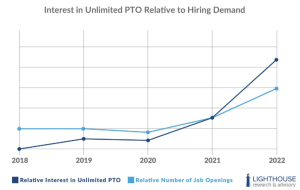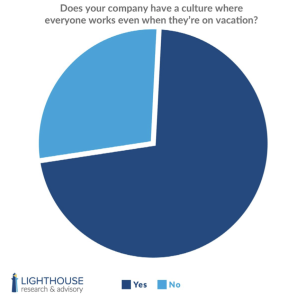Over the past few years, there’s been a steady, but significant increase in the number of companies adopting unlimited paid time off (or PTO).

It’s been done, invariably, to attract new employees – those who will unsurprisingly be drawn to a policy which promises endless vacation time.
But here in the real world, it’s fair to say that many are discovering that unlimited PTO doesn’t work (or doen’t even exist) in practice. Not only this, the policy is often harmful to employees – many of whom report they feel under immense pressure to avoid taking advantage of their “unlimited” time off, but no longer receive the financial benefits of accrued PTO.
And no, this is not just me saying this.
Last month PTO Exchange and Lighthouse Research & Advisory published the results of our latest survey of HR directors – ‘Biased, Burdensome, and Burned Out: The Real Story of Unlimited Paid Time Off’.’ In not so many words, the headline reasult was that allure of unlimited PTO quickly fades.
The survey found that when employees discover that the value of their unused vacation time will go to waste under an unlimited scheme, they say they would rather have a more traditional form of PTO.
Unlimited PTO – it found – exacerbates cultural problems, such as “always on” work environments where employees don’t feel comfortable fully unplugging from their jobs – even when they’re on vacation.
The trouble is, that at a time when there are around two job openings for every candidate who is actively seeking work, companies will continue to use the promise of unlimited PTO to entice potential employees.
To me, this is why it’s all the more important for HR professionals to really understand what unlimited PTO actually is – and how it may not meet expectations.
Unlimited PTO can lead to burnout
As the title of the report hints, burnout (an already major problem for HR teams), can actually be fuelled by that unlimited PTO.
Our survey found that 83% of employees with unlimited PTO say their companies have cultures in which people avoid taking time off because they’re too busy.
Meanwhile, three-quarters of employee respondents said they’re expected to work while on vacation.
Unfortunately, two-thirds of employees meet this expectation – ie they’re “sometimes” or “always” working when they’re supposed to be taking time off.
Consider this finding alongside the fact that 58% of US employees cite work as their primary source of mental health challenges. If employees never have the time or space to recover while on vacation, the risk of burnout is much higher.
Unlimited PTO compounds this problem because it forces employees to constantly worry about whether they’re taking too much time off, or how much time they’re taking relative to their colleagues. It forces them to worry about whether they’re putting in enough hours, and so on.
This pressures them to cut their PTO short and work – even while on vacation – which is likely to increase stress, burnout, and turnover

What purpose does unlimited PTO serve?
This is a question HR departments frequently fail to ask – but should.
A 2021 PTO Exchange study found that 60% of employees already struggle to use all their vacation time in a given year, while three-quarters say they even took “unneeded” time off to avoid letting their accrued PTO go to waste.
Yet American employees still reported that they had an average of nearly ten unused days at the end of 2021, almost a third of whom say those days don’t roll into the following year.
What is this telling us? As well as telling us that staff often fail to take what’s given to them anyway, consider this: With traditional PTO plans, unused vacation time generates huge balance sheet liabilities, as many governments require companies to account for unused time and pay it out (when an employee leaves, for instance).
This is why many CFOs are interested in unlimited PTO; it relieves them of the responsibility to keep track of how much they owe employees.
But it’s clear that employees are getting a worse deal in many cases, as they don’t get the time off or the value from their unused and accrued PTO.
So, it’s no surprise that 61% of employees say they would prefer to have payouts of their accrued vacation time upon separation rather than unlimited PTO.
However, this fact also undermines the case for unlimited PTO in general: if employees are leaving so much vacation time on the table, what’s the point of unlimited PTO in the first place?
Unlimited PTO doesn’t work for everyone
There’s no such thing as unlimited PTO.
What employees actually receive is a discretionary benefit that each employee uses differently (and inconsistently depending on the manager in question).
Our research found that there are significant racial, gender-based, and socioeconomic gaps in how employees use paid leave.
For example, women are 43% less likely than men to use all their vacation time in a given year, while non-white employees are 19% less likely to do so.
These are reminders that unlimited PTO policies make it more difficult for HR teams to meet the unique needs of diverse employees.
While many employees decide against taking all their PTO for financial reasons (non-white employees say their inability to afford a vacation is one reason for leaving PTO on the table), others do so because they’re afraid of being judged or punished.
Several of the top reasons employees cite for refusing to take time off are “fear of falling behind on work, fear of letting down a team and pressure from coworkers.”
This anxiety can be especially intense for diverse employees.
Let’s also remember this too: Unlimited PTO is capable of generating needless competition between employees, who are suspicious of how much time their colleagues take.
And even when employees genuinely don’t want the extra time off (as some reported in our survey), they’re poorly served by unlimited PTO, which offers no reward for their hard work and passion for the job.
Although unlimited PTO will continue to be a popular option for HR teams that want to get as much as possible out of employees without accruing large balances of unpaid vacation time, the evidence is building that the costs of this approach outweigh the benefits.
